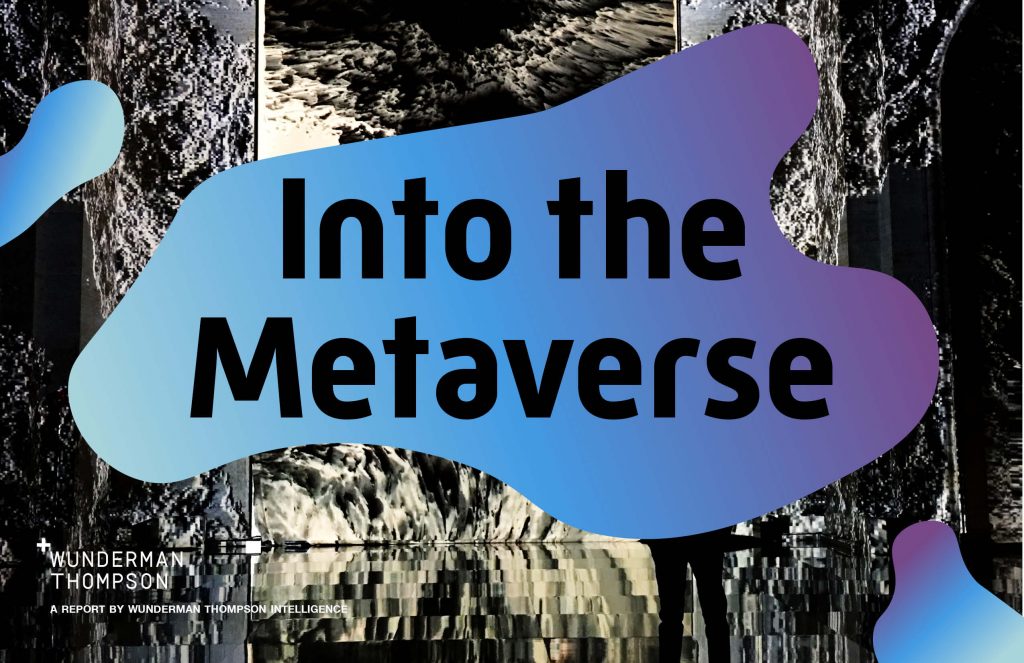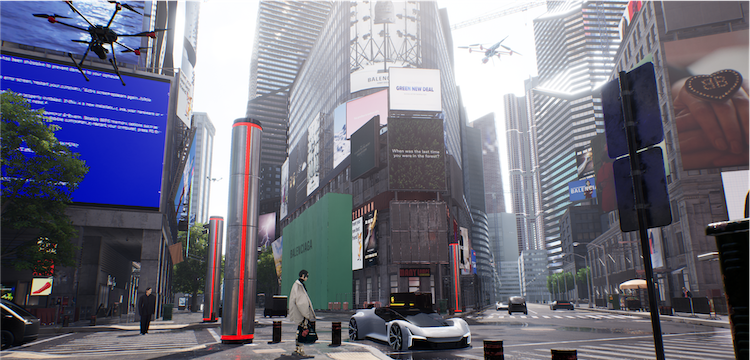Wunderman Thompson Intelligence this week publishes “Into the Metaverse”—a new report covering everything brand owners and their agencies need to know about this new paradigm, from what the metaverse is to its meaning for brands.

Interest in the metaverse—a term first coined in Neal Stephenson’s 1992 novel Snow Crash, then closely associated with gaming, meaning a world in which the digital and physical are blurred—has grown significantly over the past 12 months.
As COVID-19 lockdown measures forced many people to conduct much of daily life—from work to entertainment to shopping and social interaction—online via screens, all brands had to adapt at speed.
Now, as the world nudges towards a return to offices, schools, bricks-and-mortar stores and other physical spaces as part of its adjustment to living with coronavirus, many are assessing the lasting impact of screen-based living and the impact of accelerated blurring of the virtual and physical worlds moving forward.
Emma Chiu, Wunderman Thompson Intelligence Global Director and author of the “Into the Metaverse” report, says: “We’re entering the era of the metaverse, where our virtual and physical realities converge and we operate in a digital twin of our own world. Here, we replicate our routines, interests and obsessions: from picking outfits for our avatars to wear and cars for them to drive to constructing virtual homes or pursuing a more equitable and inclusive society online. Our report offers a glimpse into how the metaverse is shaping our future.”
To compile “Into The Metaverse,” Wunderman Thompson Intelligence conducted quantitative research among over 3,000 consumers, spanning the United States, the United Kingdom and China, in July 2021, in addition to qualitative analysis to reveal people’s understanding of and attitudes to the metaverse and identify the implications—both challenges and opportunities— for brands. The team also interviewed 15 experts for their interpretations of the metaverse and insight into how it will restructure business and industries.
The report identifies global drivers such as tech-celeration, the rise of gaming, and the battle for power in the rapidly emerging metaverse among companies such as Facebook, Roblox Corporation and Epic Games.
Drilling down, it also highlights key meta-trends impacting consumers through the creation of:
• MetaLives—characterized by the rise of virtual possessions such as digital art and NFTs, the close connection between digital access and health and wellbeing, and the significant role technology now plays in creativity. Daily habits across all areas of our lives are being transplanted into the digital realm and giving rise to extended selves and lifestyles—whether that’s digital ownership, meeting friends through technology, active content creation or turning to technology for recreational release.
• MetaSpaces—characterized by the emergence and growing popularity of new virtual venues, and the rise of blended virtual/real world spaces. With traditional gathering spaces evolving, this is redefining what home, events and vacations can mean in the meta-era.
• MetaBusiness—characterized by the recent significant uplift in “gamevertising” and the emergence of new retail frontiers. While gaming has become a playground where brands and marketers can connect with often hyper-engaged audiences, business in the metaverse is booming—opening up an abundance of opportunities, as we begin to witness the likes of automated shopping experiences, holograms and roaming avatars.
• MetaSocieties—characterized by a sharp uplift in people’s interest in cultivating hyper-real identities online, the rapid growth of business social networks, and the promise of decentralised futures. This digital reality reflects the values and standards of our physical lives—through borderless networks and virtual utopias—with groups championing social causes close to their hearts.
Interesting findings from the quantitative study include:
• Global consumers’ growing reliance on tech: 76% of all consumers surveyed say their everyday lives and activities now depend on technology, rising to 79% of gen Z (16-to-26-year-olds) and 80% of millennials (27-to-41-year-olds)
• Technology dependence now informs every aspect of daily life: 64% of global consumers say their social lives depend on it; 61% that their livelihoods depend on it; 56% that their creativity depends on it; 52% that their happiness depends on it; and 50% that their wellbeing depends on it
• Digital is redefining consumer/brand relationships: 62% of consumers say they feel closer when interacting with a brand digitally; 66% prefer to engage with brands digitally; 73% find it easier to interact with brands with a digital presence; and 85% believe digital presence will be essential for a brand to be successful in the future
• The future will be defined by technology: 93% of global consumers agree that technology is our future.
• Despite all this, only 38% global consumers have heard of the term “metaverse”
Naomi Troni, Global Chief Marketing and Growth Officer, Wunderman Thompson says: “The time has come to stop thinking of the metaverse as solely a domain for gaming. Increasingly, with the on-going blurring of the lines between the virtual and physical worlds accelerated dramatically by restrictions on what people can do in physical spaces imposed under measures to combat the spread of COVID-19, it is a new social place. And what our new report shows is that new social space is here to stay. The foundational tools and habits forming the building blocks of the metaverse are already established. Only 38% global consumers may have heard of the term ‘metaverse’, but the time is now to truly define what the metaverse is and establish a roadmap for brands’ entry.”
Source: Wunderman Thompson






You must be logged in to post a comment Login